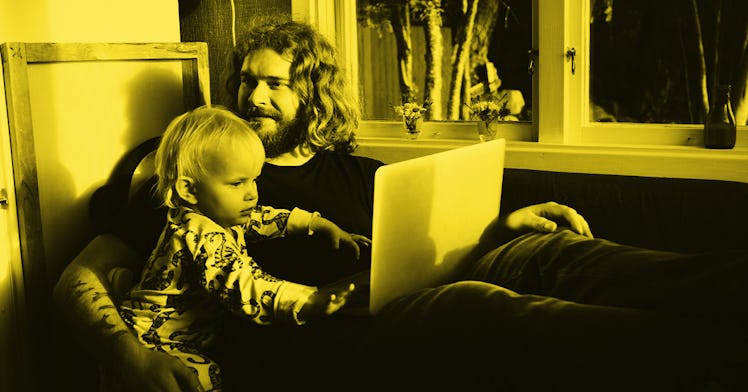The Rise and Rise of the Sexy Swedish Super Dad
The rise of the lattes papas.

In the U.S., the stylish new dad wearing both a Baby Bjorn and a meticulously trimmed beard with confidence is the exception to the rule. But, in Sweden, he’s now the norm. Over the last decade, fathers doing their dad thing manfully in public have become a cultural phenomenon in Sweden, where they’re known for looking stylish while wiping noses, changing diapers, and watching kids while their wives return to work. These men are known affectionately as “latte pappas” because the hang out in coffee shops and are frequently objectified by Swedish women. They are Scandinavian DILFs and they aren’t going anywhere.
READ MORE: The Fatherly Guide to Parenting in Other Countries
“The perception of fatherhood has changed in Sweden over the past seven or eight years,” says Martin Bertilsson, a 38-year old Swedish expat and a father of two. Bertilsson now lives in the United States, but visits Sweden often. “In Stockholm, it’s common to see four dads with expensive strollers hanging out in the park, in tight jeans, just-right white shirts, and nice leather shoes. It’s definitely a thing.”
Of course, the boom of latte papas can’t be easily attributed to one streetwear or employment trend trend. Credit goes to the Sweden’s extensive family leave program. For each child, a couple gets 480 days of paid parental leave, which can be taken up until the child turns eight. Most of those days can be shared by each parent, one at a time. But as of 2015, 90 of those days are of the use-it-or-lose-it variety—an effort to push for gender equality. The thinking, supported by groups like the Left Party, who pushed the legislation in 2015, is that when both spouses share the work of child rearing equally, the gender gap will shrink in the workplace, opening up more leadership roles for women. Pay should increase, too.
“In Sweden, studies have shown that for every month that a father takes off, a mother’s income increases significantly over the long run,” says Vicki Shabo, Vice President at the U.S.-based National Partnership for Women and Families.
The push to get more fathers to take more time off is working, albeit slowly. Last year about a quarter of parental leave benefits were paid to men, compared to half that in 1999, according to the Swedish Social Insurance Agency.With more men on paternity leave comes a newfound sense of dad swagger. These packs of men on paternity leave are stylish, confident, and masculine. By doing so, they’ve accepted their roles as modern men and symbols of gender equality. With their coffees and their kids, they’ve become international symbols of the new dad.
And while older generations may find the new, visible brand of men in Swedish parenting a bit odd, to the younger generations, a man pushing a stroller is sexy, not schlubby. Latte papas have even been immortalized in a photo book called Swedish Dads, by the photographer Johan Bavman (who is himself on paternity leave as you read this.) Bavman began the project when his first child was an infant, and found himself interested in the perception of fatherhood. Funny enough, he calls the term latte papas “silly.”
“When I first heard the term, I thought it was much easier being a stay-at-home dad,” Bavman says. “I barely had time to get a cup of coffee if I was in public.”
Bavman says that his pictures “show not the superdad, but parents that express failures, frustration, and tiredness.” He adds that since the book and exhibition have come out, dads send him pictures, and tell him that “in some way it helped them gain the confidence to stay home.”
Cultural expectations around fathering in America may eventually take a turn for the Scandinavian, but don’t expect those 16 months of paid parental leave in the U.S. anytime soon. Sweden pays for the program with its 57.1 percent tax rate.
But the dividends of equal parenting work are myriad. In Sweden, says Bertilsson, the conversation between parents is richer.
“Dads have more hands-on knowledge of baby rearing, as well as cooking,” he explains. “You’ll be at a party and the dads will be talking kid stuff and the mothers will be discussing lawn mowers. Then they’ll switch. It’s a broader idea about the work of parenting.”
This article was originally published on